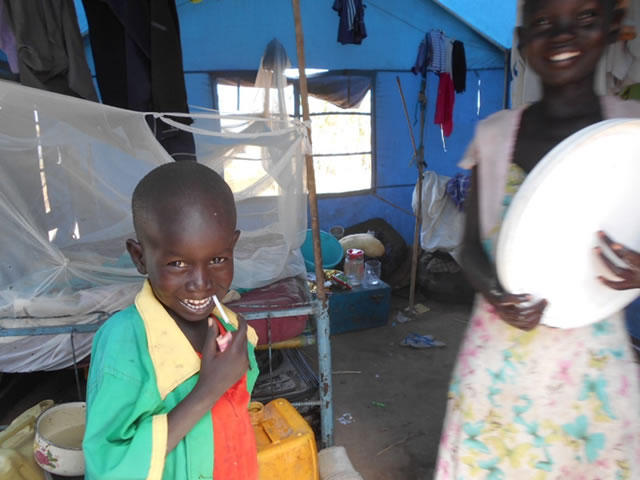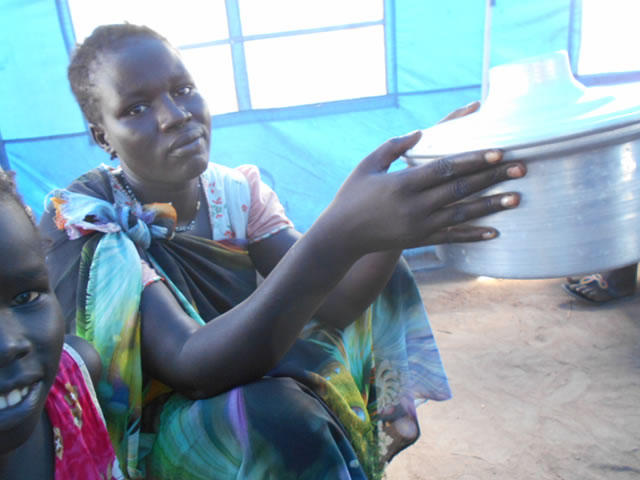– Life in a tent and the Mangaten domestic refugee camp –
[Original by Takaki IMAI, Manager for Humanitarian Assistance and Peace-Building Group (December 14, 2017); Translated by K. Adachi]
The 8th day: 30th of November (Thursday)
Obtained the certificate from South Sudan Relief Restoration Committee (RRC) for distribution of school supplies.
The headquarters of RRC is located in the area of the ministries and government offices, such as treasury ministries, which stand in a row in the center of Juba. NGOs are required to receive the approval from RRC for every kind of “goods distribution” or “goods transport,” not only limited to emergency relief. However, RRC approval provides two very critical services: 1) protection from intervention of the army and police regarding human relief activities, and 2) regulation of transported goods. The certificate of RRC at least reduces the military or police intervention on travel routes within Juba. Although it is not always easy to deal with the government in South Sudan when one wants to receive these kinds of permits, the permits for the distribution of relief goods were quickly issued this time, being extremely helpful.
Visit Camp 2 of the Mangaten refugee camp
Followed by the visit to Camp 1 yesterday, I visited the tent of Camp 2 today. The goods distribution by Red Cross South Sudan has continued today from yesterday, and the whole camp remains as busy. In addition to the heat, there were no places to sit in the small tents. Unfortunately, because of the conditions, I was unable to fully listen to and comprehend the story being told to me. There are two types of tents, large and small. When I visited one of the small tents, there were four families inhabiting it. This means there were 4 mothers and their children all living in one small tent. Awadiya, one of the mothers, lives together with four children. As I asked her to show the pot which she received from JVC, she searched for it in a big bag containing household goods, and she eventually took it out. It seems that she hasn’t used it yet.
“As the old pot can be still used, I carefully keep the new pot.” It seems that she will try to keep using the current pot until it is unusable because the new pot is very precious. The mosquito net which JVC provided is hung inside the tent. As the tent is about eight-Tatami spaces, I wonder how four families (about 20 people) could live in this one tent. There are no beds, but there is one mattress laid out along with a couple of blankets as bed sheets on the ground. There is no furniture – even a chair. I wonder how and where they sit or sleep. The residences of Camp 2 are obviously inferior to Camp 1. While there were chairs or beds in every tent where I visited in Camp 1, with the exception of one tent in Camp 2, there were no places for me to sit.
The 9th day: 1st of December (Friday)
Procurement of school supplies
We procured the school supplies from the stationary wholesaler around Konyo Konyo market. We bought from the cheapest store within the market, which we found by obtaining quotations in advance. However, we had to be careful of the quality too. While there was a wholesaler providing study notebooks cheaply, the front covers were thin and would easily be torn. We therefore chose the notebooks with plastic covers. We purchased study notebooks, pencils, ballpoint pens, erasers, and pencil sharpeners. They will be distributed soon among the 500 people in Camp 2 (The distribution in Camp 1 is planned in January 2018).
Moreover, we purchased sanitary goods for school girls. We are planning to distribute them to support 300 people in Camp 1 and Camp 2. We will provide enough for 4 months use per person and will conduct a hearing about the impact after 3-4 months (e.g., to evaluate whether school absence was reduced).
We will receive the goods we purchased from the wholesaler’s warehouse in the morning of distribution.
In next report, I will report the state of hearing about the method of life improvement for women in Mangaten domestic refugees Camp 1.
Share This:

